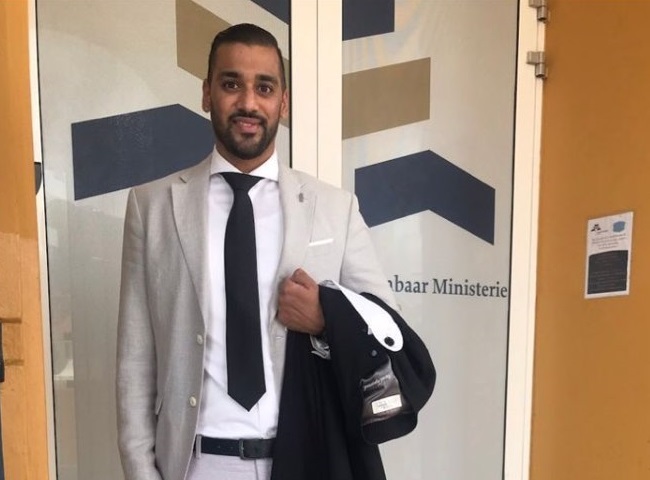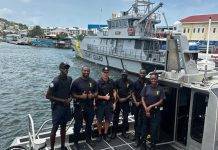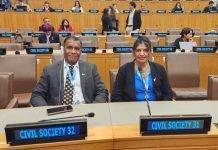
~ Training available ~
PHILIPSBURG, St. Maarten – Jurists seeking to explore another facet of the criminal justice system of the Dutch Caribbean can do this by training to become a prosecutor. This opportunity is available to two qualified persons this year and to the same number next year via the Prosecutor-in-training (Officier-in-Opleiding) programme.
The programme was expanded from one person with a Master’s Degree in Law and five years’ relevant experience to train as a prosecutor to four such spaces over two years. This is part of the push by the Office of the Attorney-General of Curaçao, St. Maarten and Bonaire, Sint Eustatius and Saba and the Prosecutor’s Offices to attract, in particular, more people from the Dutch Caribbean legal community to enter the field of prosecution.
The programme currently has one prosecutor-in-training, attorney Vidjin Awadhpersad. He is currently stationed with the Police Force of St. Maarten KPSM where he is learning about the internal procedures of the police as well as practical experience as an “officer on the beat”.
Awadhpersad was always drawn to the criminal justice system, an interest that was fueled by his criminal law studies at the Vrije Universiteit van Amsterdam (VU) and internships during his criminal law studies at the Courthouse in Amsterdam and at the Prosecutor’s Office in Haarlem. Both experiences exposed him to the way judges formulate their verdicts and how prosecutor’s approach cases.
Studies completed, he was hired as a young jurist by the Prosecutor’s Offices in Utrecht and Amsterdam along with other peers to reduce the backlog in minor cases that were piled up for various reasons.
Following this, he branched out making a career as a criminal law attorney with a law firm on Curacao. It was on that island a few years later that the opportunity to really pursue the career path he wanted presented itself – to become a prosecutor.
“I always wanted to be on the right side of the law, although I’m also aware of the fact that every suspect has the important right to get assistance from an attorney. I knew from early on that this side –as a prosecutor – fits me better,” Awadhpersad said of applying for the challenge. His background as a lawyer would proof a plus in the training process.
Head of the Prosecutor-in-Training Selection Committee Sint Maarten Chief Prosecutor Mirjam Mol said of Awadhpersad: “Vidjin showed the determination and passion for the administration of justice, key foundation points for a good prosecutor.” His knowledge of the (Dutch) Caribbean culture also aided in his selection.
To start off this training, Awadhpersad was attached to the Prosecutor’s Office Sint Maarten for one month of familiarization before heading to the Netherlands for three months of pivotal studies and examination.
After the examination, Awadhpersad headed back to St. Maarten where for eight months he worked on smaller investigations and had “on-call” duty as the (acting) prosecutor. The next phase was him conducting his own small investigations.

Curacao was the next destination for eight months; three with the Prosecutor’s Office on Curacao and for five he was stationed with the Joint Court of Justice of Aruba, Curaçao, Sint Maarten, and of Bonaire, Sint Eustatius and Saba to learn about the procedures there. This included working on cases and delivering the verdicts under the guidance of the judge (final court hearing) and the judge of instruction (pre-detention phase).
Awadhpersad is working with to KPSM for the next three months. This is not standard in the prosecutor-in-training programme. Aside from the required aspects of the training, the participant can tailor their focus.
The choice of joining KPSM was a strategic one for Awadhpersad, as the OM and police have a symbiotic relationship. “I wanted this in my training. As a prosecutor, you read on paper what’s written by the police about an incident. This way I can see for myself what the police face in the field. When paperwork comes in the future I will have a better insight into what was possible,” he explained.
His time with the police also aids in forging connections with colleagues. “When there is a good connection, it is easier and more effective to work,” Awadhpersad said. This experience, he added, will also help with getting more insight into the St. Maarten community.
Awadhpersad’s training wraps up in the coming months after which he will become a prosecutor on St. Maarten.
Awadhpersad is not the only person to get training as a prosecutor in the Dutch Caribbean.
Altagracia Rienhart-Martis was the first person to be chosen for the programme in March 2016. Armed with her Master’s Degree in Law, she was employed with the Prosecutor’s Office in Curacao at that time of her selection and had been working there for almost five years. Training completed, she is now a prosecutor stationed on Bonaire.
Rienhart-Martis, sharing her motivation for becoming a prosecutor, said it is important for the locals to be represented in the prosecution service. “The public is able to see themselves when they see the faces of the office and not have people that don’t speak their language,” she said.
Further, she added suspects and victims deserve to be able to express themselves in their own language while addressing the prosecutor and to trust that they are being understood. “Not only by the words they use, but also by the various different ways in which they say those words, which each time has a different meaning,” said Rienhart-Martis.
Being a prosecutor is not only a good way to serve one’s community; it has its own personal rewards. Rienhart-Martis said her best moments related to victims who shared their happiness about her listening to their side of the story, for taking them seriously, and for giving her all to their case.
“Regardless of the outcome of the case, being able to give people closure or make them feel like justice has been done for them is the fuel that keeps me going each and every time. After all, that’s the main reason I applied for this job -to make sure I help justice be served,” Rienhart-Martis.
To learn more about the prosecutor-in-training programme, visit https://www.openbaarministerie.org/nl/organisatie/officier-in-opleiding.



























